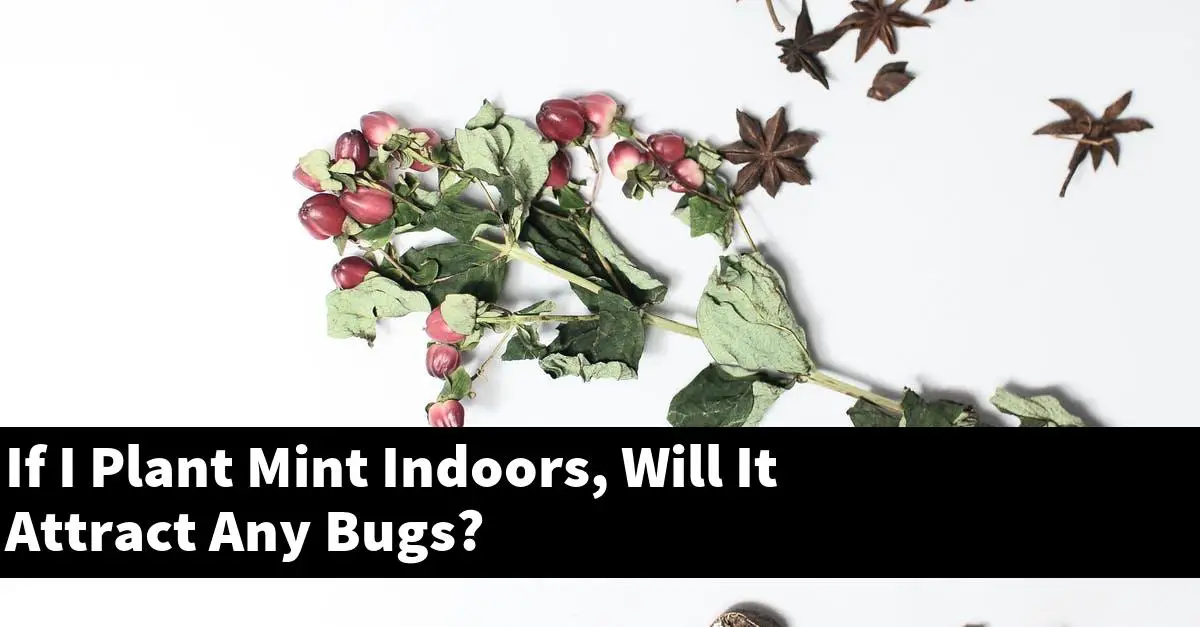Mint is a popular herb that is often used in cooking and as a natural remedy. Some people also grow mint indoors for its fresh scent and to deter pests.
But does mint actually repel bugs? And if so, which ones?
Does mint attract house flies?
Mint does not attract house flies.
Does mint repel mice?
Mice are attracted to the smell and taste of mint. When mint is used as a repellent, it can keep mice from entering a building or area.
Does mint repel mosquitoes?
Mosquitoes are attracted to mint because of the menthol and other oils present in mint. When mosquitoes land on mint, they are repelled by the smell and the texture of the leaves.
Do indoor plants attract bugs?
It depends on a variety of factors, including the size, species and condition of the plants, the environment in which they are grown, and the behavior of the bugs in question. Some people believe that indoor plants can occasionally attract bugs, but this is largely anecdotal.
Overall, the likelihood that plants will attract bugs is relatively low.
What insect does mint keep away?
Mint is a type of herb that is used to repel insects. It contains a number of chemicals that make it poisonous to insects.
Mint also has a strong odor, which makes it unpopular with some insects.
How do you keep mint from going to seed?
Mint is a herbaceous perennial plant that can grow up to one meter in height. The leaves are compound, with serrated margins.
The flowers are small and green, and are pollinated by bees. The fruit is a small, greenish-white berry.
Mint is a difficult plant to keep from going to seed. The main reason is that the seed produces a storage organ, called a silique, that contains the seed’s embryo.
This silique is located near the base of the flowers. The silique is often scooped out by gardeners when the flowers are harvested, contributing to the problem of mint going to seed.
Another factor that contributes to mint going to seed is the plant’s tendency to self-seed. This means that when a plant flowers and produces a silique, the silique will contain the embryos of other plants as well.
In order to prevent this from happening, gardeners often hand-pull the flowers when they are harvested, or use a hoe to dig up the plants before they flower.
Despite these difficulties, mint is a relatively easy herb to grow, and is a popular garden plant. If you want to keep mint from going to seed, the best way to do so is to make sure that the plants are not self-seeding, and to harvest the flowers when they are in bloom.
Why do bugs hate mint?
Most bugs dislike the smell of mint, likely because mint is a common herb used to repel them. The smell of mint also masks the smell of other predators, such as spiders, that may be interested in eating the bug.
How to grow mint indoors?
Mint is a perennial herb that can be grown indoors in temperate climates. The plant grows best in a well-drained soil with a pH of 6.0-7.5. Mint should be planted in a sunny location and given plenty of water.
The plant can be fertilized with a balanced organic fertilizer monthly. Once the plant has established, it can be trimmed back to the desired height.
Does mint repel spiders?
There is little scientific evidence to support the claim that mint can repel spiders. Some anecdotal evidence suggests that spiders may be repelled by the smell of mint, while other claims suggest that spiders may become trapped in the strands of mint leaves.
However, there is no scientific evidence to support the claim that mint can repel spiders.
What bugs does mint repel?
Mint is a type of herb that is thought to repel bugs. Some bugs, like mosquitoes, are attracted to the smell of mint.
Others, like cockroaches, are repelled by mint.
What does peppermint attract?
Peppermint attracts bats because of its high levels of the oil menthol. Bats use menthol to detect prey in the dark.
What insects are attracted by mint?
Mint is favored by a number of insects, including bees, ants, and butterflies. These insects are attracted to the scent of mint, which is a combination of chemicals including ethanol, menthol, and methyl salicylate.
These chemicals are responsible for the minty smell.
Is it ok to grow mint indoors?
It is generally ok to grow mint indoors, but there are a few things to be aware of. First, mint is a cool-weather plant, and will not do well in warm climates.
Second, mint needs lots of light, so if your home is dark, mint may not grow well. Finally, mint is a prolific grower, so it may quickly outpace your space if not handled correctly.
Conclusions
Mint is a natural pest repellent, so planting it indoors should help keep bugs away.

